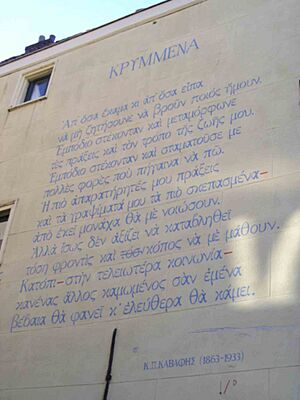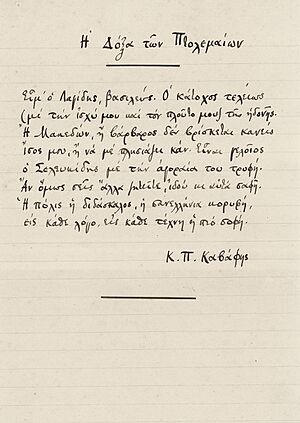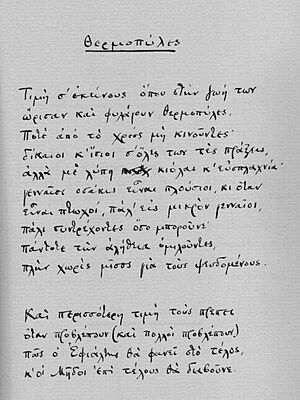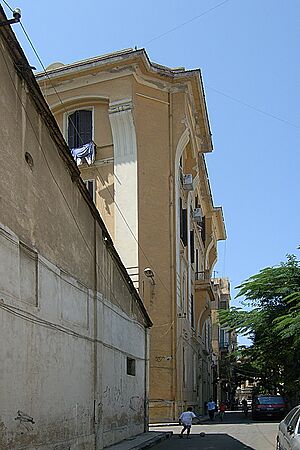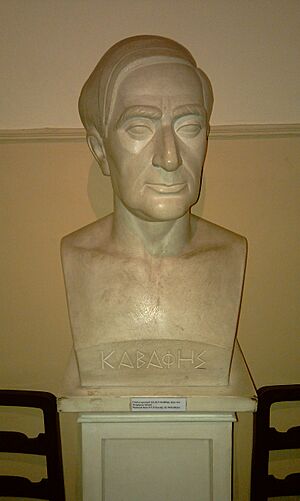Constantine P. Cavafy facts for kids
Quick facts for kids
Constantine P. Cavafy
|
|
|---|---|
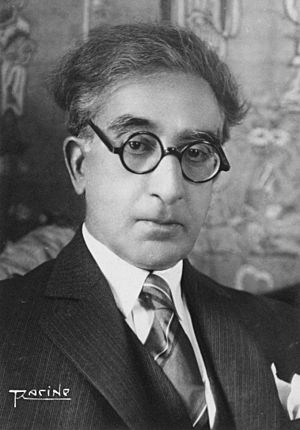
Constantine Cavafy in 1929
|
|
| Born | April 29, 1863 Alexandria, Egypt Eyalet |
| Died | April 29, 1933 (aged 70) Alexandria, Kingdom of Egypt |
| Resting place | Greek Orthodox Cemetery, Alexandria, Al Iskandariyah, Egypt |
| Occupation | Poet, journalist, civil servant |
| Nationality | Greek |
| Signature | |
Konstantinos Petrou Kavafis (Greek: Κωνσταντίνος Πέτρου Καβάφης; April 29, 1863 – April 29, 1933) was a famous Greek poet, journalist, and government worker from Alexandria, Egypt. Many people know him as Constantine P. Cavafy.
A writer named E. M. Forster helped introduce Cavafy's poems to English speakers in 1923. He described Cavafy as "a Greek gentleman in a straw hat, standing absolutely motionless at a slight angle to the universe." Cavafy's unique writing style made him one of the most important poets in Greek and Western poetry.
Cavafy wrote 155 complete poems. He also had many more that were unfinished. He didn't want to publish his work in books. Instead, he shared his poems in local newspapers and magazines. He even printed them himself to give to people who were interested. His most important poems were written after he turned 40. They were published two years after he passed away.
Contents
About His Life
Cavafy was born in 1863 in Alexandria, Egypt. His parents were Greek and came from Istanbul. He was baptized into the Greek Orthodox Church. His father was a successful trader who had lived in England and became a British citizen.
After his father died in 1870, Cavafy and his family moved to Liverpool, England, for a while. In 1876, his family lost money because of a big economic downturn. So, by 1877, they had to move back to Alexandria.
In 1882, there were problems in Alexandria. This made his family move to Constantinople for a short time. This was when a revolt started in Alexandria against the British and French control of Egypt. The city was attacked by a British fleet, and the family's home was burned.
In 1885, Cavafy returned to Alexandria. He lived there for the rest of his life. First, he worked as a journalist. Then, he got a job with the British-run Egyptian Ministry of Public Works. He worked there for thirty years. Egypt was under British protection until 1926.
From 1891 to 1904, he printed his poems on single sheets of paper. He shared them only with his close friends. He became known mostly within the Greek community in Alexandria. In 1903, he was introduced to Greek writers in mainland Greece. This happened after a good review by Gregorios Xenopoulos.
He didn't get much recognition at first. This was because his style was very different from the popular Greek poetry of that time. It was only about twenty years later that new poets found inspiration in Cavafy's work. This happened after Greece lost the Greco-Turkish War (1919–1922).
Cavafy wrote a short note about himself:
I am from Constantinople by descent, but I was born in Alexandria. I left very young and spent much of my childhood in England. Later, I visited England again as an adult, but for a short time. I have also lived in France. During my teenage years, I lived over two years in Constantinople. It has been many years since I last visited Greece. My last job was as a clerk at a government office under the Ministry of Public Works of Egypt. I know English, French, and a little Italian.
Cavafy died from cancer of the larynx on April 29, 1933. This was his 70th birthday. Since his death, Cavafy's fame has grown a lot. His poetry is now taught in schools in Greece and Cyprus. It is also studied in universities around the world.
E. M. Forster knew Cavafy personally. He wrote about him in his book Alexandria. Forster, Arnold J. Toynbee, and T. S. Eliot were some of the first people to promote Cavafy's work in the English-speaking world. In 1966, artist David Hockney created a series of prints to illustrate some of Cavafy's poems.
His Poems and Style
Cavafy played a big part in bringing back and recognizing Greek poetry. His poems are usually short but very personal. They often describe real people or places important to Greek culture. Some of his main themes include:
- Uncertainty about the future
- Pleasures of the senses
- The feelings and thoughts of people
- A feeling of sadness for the past
Besides his unusual topics for the time, his poems also show great skill. Cavafy was a perfectionist. He carefully worked on every line of his poetry. His later style was a free iambic form. This means the lines rarely rhyme and usually have 10 to 17 syllables. When he did use rhyme, it often meant he was being ironic.
Cavafy got his ideas from his own life. He also had a deep knowledge of history, especially the Hellenistic era. Many of his poems are like historical stories. They might be based on history, or seem historical, or be accurately historical but with a twist.
One of Cavafy's most important works is his 1904 poem "Waiting for the Barbarians". The poem starts by describing a city that is falling apart. Its people and leaders are waiting for "barbarians" to arrive. But when night comes, the barbarians haven't shown up. The poem ends with the line: "What is to become of us without barbarians? Those people were a solution of a sort." This poem has influenced many other literary works.
In 1911, Cavafy wrote "Ithaca". This poem was inspired by Homer's story of Odysseus returning to his home island. The poem's main idea is that the journey of life is more important than the destination. It says: "Keep Ithaca always in your mind. / Arriving there is what you’re destined for." The poem suggests that you should start your journey with hope. At the end, you might find that Ithaca has no more riches to give you. But, "Ithaca gave you the marvelous journey."
Almost all of Cavafy's work was in Greek. However, his poetry was not fully appreciated in Greece until after 1935. This was when the first collection of his poems was published. His unique style and language were criticized by some. But his use of metaphors, historical images, and his focus on perfection have made him a lasting figure in Western literature.
Historical Poems
Cavafy wrote many historical poems about famous people and everyday individuals. He was especially inspired by the Hellenistic era, with Alexandria as a main focus. Other poems come from ancient Greek and Roman times, and the Byzantine era. He also used ideas from myths. The periods he chose were often times of decline. His characters often face a final end.
Some of his historical poems include:
- "The Glory of the Ptolemies"
- "In Sparta"
- "The First Step"
- "In the Year 200 B.C."
- "Alexandrian Kings"
- "The God Forsakes Antony"
- "Myres: Alexandrian A.D. 340"
Philosophical Poems
These poems are also called instructive poems. They offer advice to poets or deal with other life situations. For example, they might talk about feeling alone (like in "The walls"), doing your duty (like in "Thermopylae"), or human dignity.
The poem "Thermopylae" reminds us of the famous battle of Thermopylae. In this battle, 300 Spartans and their allies fought against a much larger Persian army. They knew they would likely lose. The poem suggests that there are certain principles we should live by. "Thermopylae" represents the place where we stand up for our duty. We keep fighting even if we know we might fail.
In another poem, "In the Year 200 B.C.", Cavafy talks about an ancient inscription. This inscription was from Alexander the Great to Athens after a battle. Cavafy praises the ideas of the Hellenistic era. He criticizes narrow-minded ideas about Greek culture. However, in other poems, his view of the Hellenistic era can be a bit unclear. Sometimes he describes it as a time of decline.
Another poem is about a Greek trader from Samos. He was sold into slavery in India and died by the Ganges River. He regretted his greed for money that led him so far away. He wished to die "surrounded by Greeks" in his homeland.
Cavafy's Museum
Cavafy's apartment in Alexandria has been turned into a museum. The museum has some of Cavafy's drawings and original handwritten poems. It also has many pictures and portraits of him.
See also
 In Spanish: Constantino Cavafis para niños
In Spanish: Constantino Cavafis para niños
 | Leon Lynch |
 | Milton P. Webster |
 | Ferdinand Smith |


